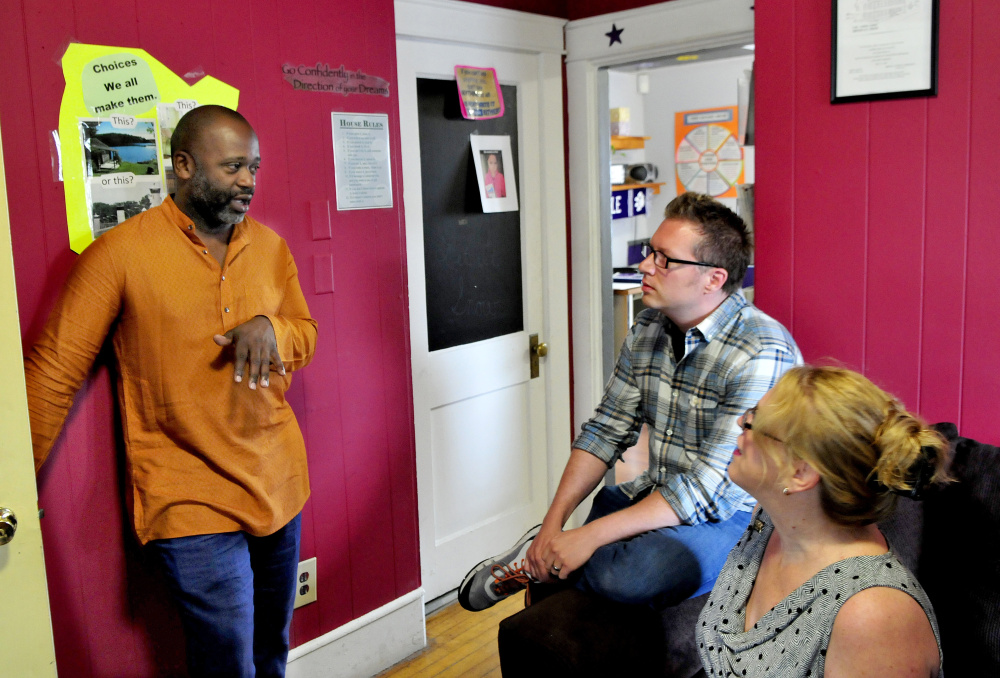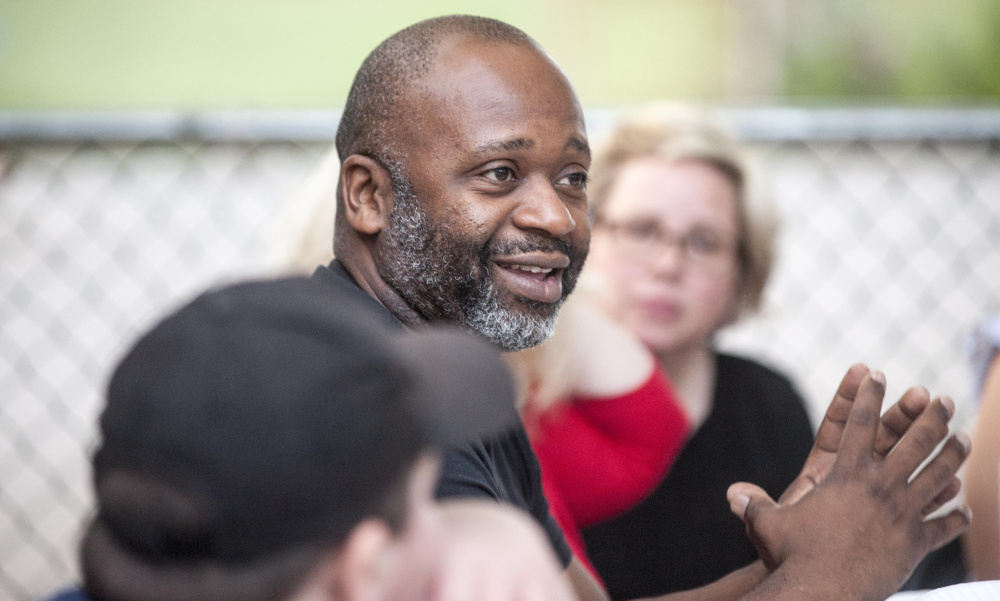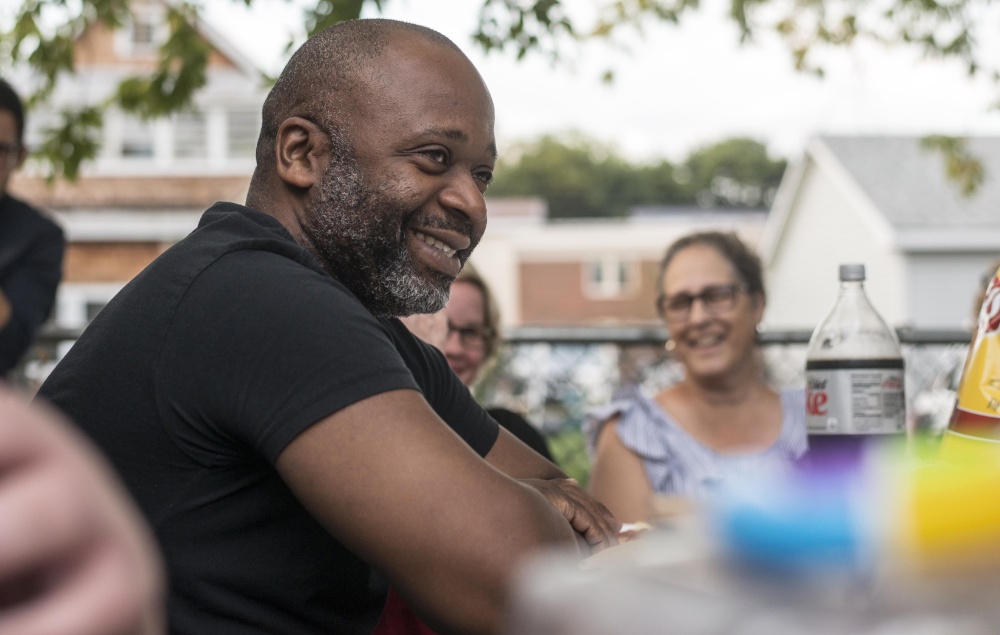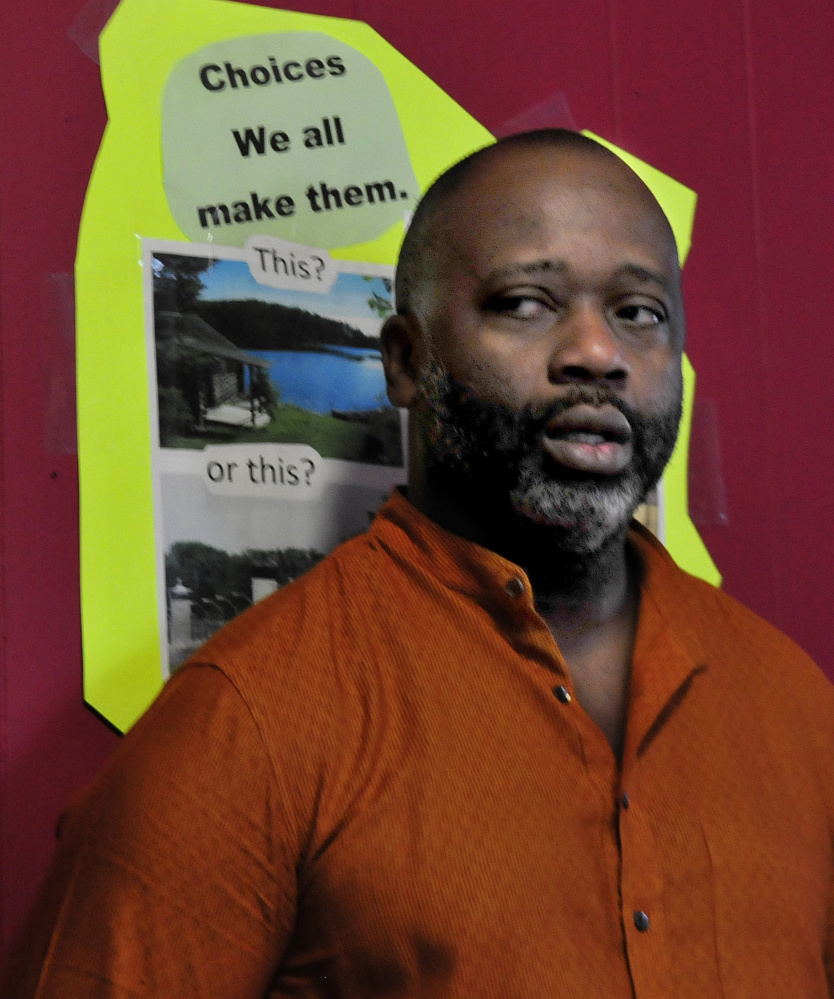WATERVILLE — Brainstorming creative solutions to ongoing challenges in the city’s South End was the focus of a meeting Wednesday night at the South End Teen Center that drew an enthusiastic crowd of residents, city councilors, Colby College staff and a world-renowned artist who thinks outside of the box.
Chicago-based artist Theaster Gates, a social practice installation artist who helps revitalize neighborhoods by combining art and urban planning, is the first artist-in-residence at Colby College’s Lunder Institute for American Art. The institute, established through a major gift to Colby by Peter and Paula Lunder, makes Colby the only liberal arts college with an innovative art museum dedicated to cross-disciplinary study and a global research center for American art. Gates on Tuesday night gave the institutes’s inaugural speech.
On Wednesday, he listened to South End residents’ concerns and bounced ideas around for solving them. So many people showed up for Wednesday’s meeting at the Teen Center — about 50 — that South End Neighborhood Association Coordinator Jackie Dupont moved it outside under the trees.
Several residents said there is a serious lack of sidewalks on South End streets, making it dangerous for pedestrians to get from one place to another.
Longtime South End resident and community organizer Heather Merrow said that, as strange as it sounds, the lack of sidewalks prevents people who live in the South End from leaving that area of the city — to walk to a Hannaford grocery store on Kennedy Memorial Drive or downtown, for instance.
“In order to get out of the South End, you’re taking your life into your own hands,” Merrow said. “To get over to Silver Street is an issue, to get up to Main Street is because you’re walking by six lanes of traffic. …There is no way to get out.”
Annastasia Greene said she tries to push a stroller with her daughter in it but has to walk in the streets much of the time because of lack of sidewalks. Some people also complained that in winter, sometimes sidewalks do not get plowed.
Greene wondered aloud if residents could get together and march to City Hall to talk about the problem with the mayor or city manager. Merrow recommended she go to a City Council meeting to air her concerns.
Gates told the group about similar experiences he had in his Chicago neighborhood, where people would go to aldermen’s meetings to complain about all sorts of things — speeding traffic, burglaries, dangerous alley ways, garbage pick up and snow removal.
He got tired of complaining himself and started thinking about things he could do to solve the problems, he said. He approached his neighbors and devised a Christmas decoration competition and called the newspaper and said the neighborhood was going to have a big home decorating contest and the commissioner of culture would be judging the competition.
“Lo and behold, the snow plow came the next day — they didn’t want the middle class people to come to a poor neighborhood and go down the street to see Christmas decorations with snow in the road,” he said
Gates said the South End could get creative and call the owner of an asphalt company and say they need help with some projects and tell the owner they would host Blacktop Tuesdays and if he sponsored them, they would erect a banner with the company’s name in a prominent place. South End residents could try that method instead of trying to approach a mayor or city councilor who may not have any money to spend for such projects, he said.
“Some of these solutions, they have to be home-grown,” Gates said, “and the more homegrown and sexy they are, the more people will want to take credit.”
Gates recently won the 2018 Nasher Prize for Sculpture, which came with a $100,000 award from the Nasher Sculpture Center in Dallas. The accolade is given to a living artist who elevates the understanding of sculpture and its possibilities.
At Colby, he will work with students in classrooms and those students will explore partnerships with community organizations and opportunities for arts-based projects downtown, according to Colby officials.
As part of his work, Gates re-imagines and transforms vacant buildings into cultural spaces. His works have been shown at places including the Smithsonian American Art Museum, The Whitney Biennial and National Gallery of Art.
Colby President David A. Greene said recently in a press release that Gates is “reshaping the field of art and reinvigorating communities through his innovative, creative spirit.”
“His work, which is being exhibited in the world’s most prestigious galleries, allows us to see everyday and historical objects in new ways, challenging our appreciation of beauty in our lived experiences. And there may be no one more influential working at the intersection of art and community development. He sees possibility where others see despair. His outlook is just what we need right now and we are thrilled to have him at Colby and in Waterville to launch the Lunder Institute.”
Colby is investing millions of dollars in Waterville’s downtown to help revitalize the city. The college is building a $25 million residential complex on Main Street that will house more than 200 students who will be involved in community service and civic engagement. The college also renovated the historic Hains building across the street and is planning to build a boutique hotel on the south end of Main Street next year.
Gates bought an abandoned bank from the city of Chicago for $1 and transformed it into a library of historic black publications. When the city cut down 90,000 trees that were infested with emerald ash borer beetles, they offered two of the trees to Gates for use in an art project — he instead took all 90,000 trees, created a mill that employed local people and milled thousands of feet of lumber that was taken to University of Chicago to help in the building of a new policy center.
Earlier Wednesday, Gates toured the city’s South End with the South End Neighborhood Association, learned about the history of the neighborhood and its programs and challenges and visited the South End Teen Center where he was brief on its programs, projects, missions and objectives.
Amy Calder — 861-9247
Twitter: @AmyCalder17
Send questions/comments to the editors.








Success. Please wait for the page to reload. If the page does not reload within 5 seconds, please refresh the page.
Enter your email and password to access comments.
Hi, to comment on stories you must . This profile is in addition to your subscription and website login.
Already have a commenting profile? .
Invalid username/password.
Please check your email to confirm and complete your registration.
Only subscribers are eligible to post comments. Please subscribe or login first for digital access. Here’s why.
Use the form below to reset your password. When you've submitted your account email, we will send an email with a reset code.